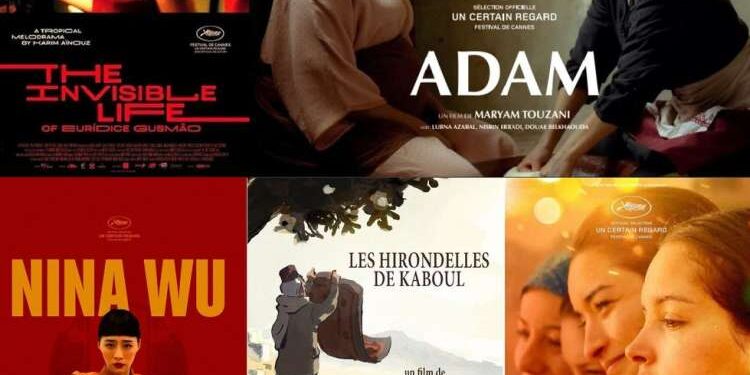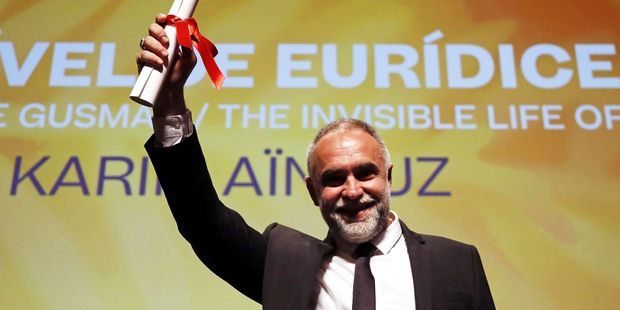In 2018, during the 71st edition of the Cannes Film Festivala climb of the marches including 82 women had taken place to demand equal pay and protest against the injustices that the cinema professionals must face. They had recalled that 82 is the number of women held in competition for the Palme d’Or by the festival since its first edition in 1946, against 1688 men and that 71 directors had received a palm of gold, against only two women: Jane Campion, in 1993, for The piano lessonex aequo with the Chinese Chen Kaige, and Agnès Varda, for a palm of honor in 2015.
For this 2019 edition, it is obvious that we are still far from parity be the directors for film selections, but we can still see that among the eighteen films offered in The a certain look selectionseveral speak of women and some are even made by women.
Five films, including an animation, particularly denounced the aggressions and the injustices they undergo.
Kabul’s swallows:
Kabul’s swallowsco-produced by Eléa Gobbe Mevellec and Zabou Breitman and taken from the book of the Algerian Yasmina Khadra, shows us Afghan women prisoners of the Taliban, they are trapped in their homes, prisoners in their burqas and victims of the worst repression and injustices. One of them, a young woman in love with freedom and art will try to revolt in vain against this repression. Unjustly accused of the murder of her husband, she will find help with her jailer and her wife.
Papicha:
Papichadirected by Mounia Meddour of which this is the first feature film, tells the struggle of young Algerian students against the rise of religious fundamentalism during the dark years. A very beautiful film, which keeps in suspense from start to finish. He will crescendo in the horror of extremism and especially in the subjugation of women.
We also see how men, supposedly progressive, also gradually be won by the sexist theories of extremists, assimilate them and end up participating in the oppression of women and the restriction of their freedoms, especially clothing.
The young Nedjma, the main character of the film, who refuses to be taken by this movement and decides to carry out her project of fashion parade to the end, thereby becomes a kind of symbol of resistance. Her friends and she simply refrains from stopping living. They reject the liberticidal rules in which we want to lock them up, despite the violence they undergo!
This film, if it is a historical reminder for the Algerians, could be a warning for Tunisian women: if you are not careful, you can easily take the trap of fundamentalism!
Adam:
Adam of the Moroccan Maryam Touzani Tells the meeting of two women, Samia and Abla.
Samia, single and pregnant, is looking for a refuge for the few months left before giving birth and abandoning her baby to resume her life, her work, return to her family, start a family.
Like many young women, she had believed the promises of a man who had made her sparkle the marriage but who had dropped her when she found herself pregnant. Classic story. Samia must therefore assume the responsibility of an act committed to two on their own. But as much as our Arab-Muslim societies are indulgent towards men and their sexual freedoms, they are as fierce and condemn without appeal women who “succumb” them to hide and abandon their children.
Abla is a young widow who has failed to mourn her husband who was suddenly snatched from her. While raising her little daughter, she tries to protect herself from society that does not forgive any gap for single women.
Meeting these young women will change their lives forever! A very moving film!
Nina Wu:
Nina Wudirected by the Taiwanese Midi Z, is a psychological thriller inspired by the Harvey Weinstein affair and the #MeToo movement which shows the path strewn with pitfalls of young actresses to be able to obtain important roles in films, and how far they can go to get there, going so far as to undergo rapes, submission, insults….
Nina left her family and her provincial city to settle in Taipei in the hope of making an acting career. Eight years later, when she has only shot a few short films and advertisements, she will finally pass a hearing for the main role of a feature film … It is through the story of Nina that the director denounces this violence and more particularly the fact that you have to sleep to succeed, repress your feelings, make violence even, internalize your guilt, be silent, get lost, to finally get to the Great Festivals!
The invisible life of Euridice Gusmao:
The invisible life of Euridice Gusmaodirected by Karim Aïnouz tells the completely different fate of two sisters during the 1950s in Rio de Janeiro: Guida, 20, a single mother who fights to raise her son, even if it means going through prostitution and the other, Euridice, 18, who lets herself be crushed by the weight of the daily life of a good wife while fighting to realize her dream of a career as a pianist. Through their father’s fault, they will be separated and will have to hang their destinies in hand, without ever giving up on.
Through this film, Karim Ainouz wanted to pay tribute to her mother, herself a single mother having to get to raise her alone, and to all the women of her generation which we do not speak enough, as if they had been somehow “invisible”.
Very beautiful film. For 139 minutes, the director holds the spectator in suspense, but above all makes sure that he feels all the sorrows and joys of these two young women, that he lives with them their physical and moral sufferings, one fighting for his freedom, working hard to be independent, refusing to become as his mother completely submissive to his father, and the other undergoing the ordeal of a woman at home, who sees his dreams of emancipation times by her duties towards her husband, his father and his family in his capacity as wife and mother.
The invisible life of Euridice Gusmao won the Un certain Locat prize, amply deserved.
(C
The invisible life of Euridice Gusmao by Karim Aïnouz has won the Un Certain Regard Prize
It is a shame that the other films left empty -handed. Papicha And Adam had however been the subject of a standing ovation of a good fifteen minutes during their projections and actress Nisrin Erradi who plays the role of Samia in the film Adam Could have deserved to win the Best Interpretation Prize for the accuracy of her game. The jury, chaired by director Nadine Labaki (another woman!) decided otherwise.
Five films, five countries, destinies of women who each suffer in its own way the weight of injustices and patriarchal societies in which they live. Five films that tell and denounce at the same time. Hoping that they can push for reflection and change the situations of women, not only in these five countries, but around the world!
Neïla Driss
Read on the same subject:










